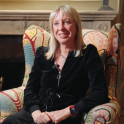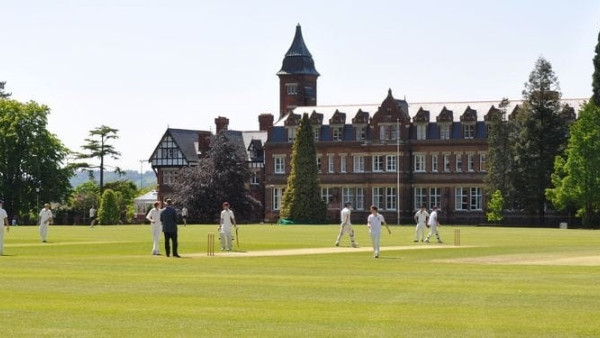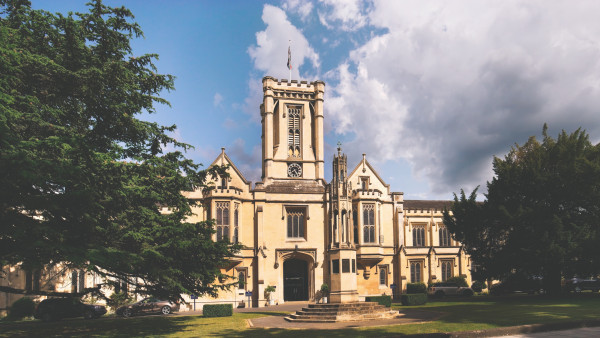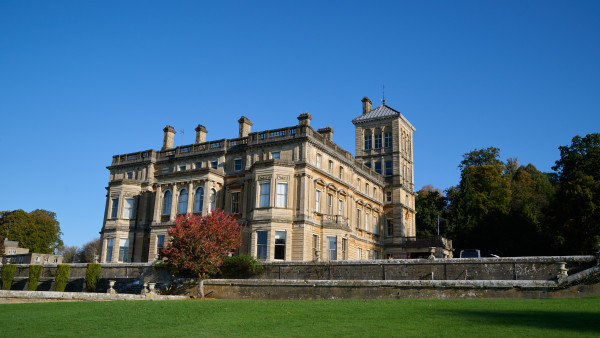Smaller, less pressurised and more grounded than some of its neighbours, with parents also drawn to the focus on the whole child, along with the strong sense of community, heritage and tradition. ‘They get the best out of each child in every area – remarkable, really,’ said a parent.
Why read our school review?
Unlike other websites, schools can't pay to be included in The Good Schools Guide. This means our review of this school is independent, critical and fair, and written with parents' best interests at heart.
Overview & data
- Pupil numbers
- 533 ·
- Sixth form numbers
- 128 ·
- Religion
- C of E
- Fees
- £23,055 - £27,150
- Local authority
- Gloucestershire County Council
- Linked schools
Headteacher
Headmaster
Mr David Morton
Since 2017, David Morton, whose wife, Annie, works in the development office and whose two sons attend the school. Even their fox-red lab, Pip, is brought in from their on-site home for wellbeing days. A local chap, he attended King’s School Worcester, then studied geography at Exeter and gained a PGCE from Cambridge. Started out teaching at Bedford School followed by Kingston Grammar, then Alleyn’s, where he was assistant head and head of middle school, and finally King Henry VIII School, where he was deputy head before coming here.
Not one to let the grass grow, he is praised by parents for ‘really modernising the place’, overseeing ‘a dynamic blend’ of new facilities, new teachers and ‘upping the sense of aspiration’ – as well as creating more diversity, community links and equality between the genders (eg in sport). He has also grown the student body by over 200. Next on his list is growing the bursary fund and planning for a performing arts centre (but don’t hold your breath – he’s working hard to keep fees low since Labour’s VAT announcement).
‘He’s changed the whole vibe and is very effective,’ said one parent, another calling him ‘a very good leader’ and ‘not afraid to make tough decisions’. A mild-mannered and unimposing head, we weren’t surprised to hear from students that ‘he never raises his voice even when he’s showing his authority’ – with his very carefully considered responses to our questions revealing a touching devotion to the school.
Year 7s enjoy his weekly cookery club – ‘t-oat-ally tasty biscuits’ next up. If they’re anything like the King’s embossed shortbreads, they’re in for a treat. In fact, we could hardly tear ourselves away the seemingly endless array of sweet treats in his gorgeous office – although what really caught our eye (and saved our waistlines) was his Lego construction of Hogwarts, truly a work of art and his pride and joy.
Lego aside, he also loves running (including as part of Team King’s at the Gloucester 10K annually), hockey (he organises community hockey for staff, pupils and parents at King’s six times a year) and mountain biking – and he’s also a Gloucester Rugby fan, avid reader, lapsed globe-trotter, eco-warrior and local charity supporter.
Year 7s enjoy the head’s weekly cookery club – ‘t-oat-ally tasty biscuits’ next up. If they’re anything like the King’s embossed shortbreads, they’re in for a treat
Entrance
If your child is of average intelligence or above, they’re in with a decent chance – particularly if they can present well at interview and show keenness for the wider curriculum. Main entry point is year 7, when around 30 juniors are joined by around 45 newcomers, mainly from state primaries (but some from local preps, mainly Berkhampstead and Richard Pate). Another 10 arrive in year 9 (and occasionally years 8 and 10, as well as mid-academic year), bringing the year group up to its maximum of 90 pupils. Entrance via assessments in maths, English and online aptitude test (CEM) (and candidates are also asked to bring a piece of current schoolwork on assessment day). Taster days available, plus termly Saturday workshops for year 5s. Waiting lists in some year groups. Around 15-20 join in year 12, when students need six grade 6s at GCSE, including 5s in English and maths and 7s in chosen A level subjects. At all stages, candidates are interviewed and reference sought from current school.
Rarely have we heard such praise for the admissions process. ‘At every touchpoint, the communications were responsive, friendly and positive and we didn’t feel we were putting our lamb to the slaughter like at some other schools,’ said one.
- Open days
- October, March and June
Exit
A third leave after GCSEs, ‘generally from the lower ability range’, to local colleges or state schools. Vast majority to university, 40 per cent to Russell Group. Real breadth of universities and courses – Durham, Exeter, Nottingham and Birmingham popular recently. In 2025, two to Oxbridge and one medic. Good on degree apprenticeships – recently in finance and computer science. Others into the Forces, dance school, acting (lead role in TV series) and a highly competitive IBM internship in New York.
Latest results
In 2025, 53 per cent 9-7 at GCSE; 40 per cent A*/A at A level (67 per cent A*-B).
A levels or equivalent - Average points score (2024)
What is this?
These figures tell you the average grade and average points that pupils achieved in their academic qualifications. A maximum of 60 points are available for a grade A* at A level.
Teaching & learning
Good for all-rounders and those unsuited to the more narrowly selective local schools. One parent, whose daughter ‘did really well in her GCSEs and exceeded all our expectations’, said, ‘Would she have done as well at a different school? Possibly, but the attention she had throughout meant she also had time for all the clubs and never felt pressured.’
Results hover well above Wycliffe, well below Cheltenham Ladies College (but school points out they have a large international contingent) and on a par (give or take some fluctuations) with Cheltenham College, Dean Close and Rendcomb. At least a few high-flyers in every year group – increasingly so, with several parents telling us they moved their child from more academic schools where they had lost confidence but ‘almost instantly thrived here’.
Small classes of around 16 (max 20, and nearer 10 at A level) appreciated by all. We saw just four students in an A level biology class and two in Latin. Some setting – in maths from year 7, and English and science from year 8. The result? Good personalised teaching, with teachers going round to individual students in almost every lesson we visited, showing understanding of different learning styles too – ‘Harry, you’ll ace this bit’ etc. Must help that teacher/student relationships are so warm and relaxed and, hard as we tried, we didn’t spot a whiff of classroom disruption (even in lessons with cover teachers).
‘Exceptional’ language provision, say parents, who cite the high proportion of native speaking staff and ‘willingness to help my son catch up in every way possible’. One told us, ‘Our son seems to be quite the language boy and we had no idea!’ Spanish and French for all and optional at GCSE, and Latin for the most able linguists from year 8 (and classical Greek is available at GCSE).
Nine GCSEs for most – 10 for the 25 per cent doing triple science and 11 for those adding Latin on top of that. Geography, history, PRE, computer science, business and PE all popular. At A level, most do three subjects, with maths, English, geography and business getting biggest numbers. Around half do an EPQ, and there’s also a sports leadership award offered. All sixth formers follow the Future Skills programme, learning how to manage finances, cook, live away from home, do first aid and vehicle maintenance etc. One parent whose son joined in year 12 was ‘delighted by the high expectations for the students, all backed up with extra support where needed – we’ve been so impressed’. Homework levels on the high side throughout, ‘but you get used to it’.
Teacher/student relationships are warm and relaxed and, hard as we tried, we didn’t spot a whiff of classroom disruption (even in lessons with cover teachers)
- Qualifications taken in 2024
- A level
- BTEC
- EPQ
- GCSE
- VRQ
Learning support & SEN
One in four students is supported by the full-time SENCo and assistant (numeracy specialist), backed up with expertise from other teaching staff with a literacy or numeracy background and a visiting ed psych, alongside other external specialists. ‘We’re a bit broader in terms of who we place on the register here,’ explains SENCo, ‘as it includes anyone who may have a difficulty even if they don’t have a diagnosis.’ Lots of arrivals from the state sector. ‘Coming here felt like landing on a different planet,’ said one parent, ‘it’s been the making of her.’ Dyslexia is the main need, but there’s also ADHD, autism etc. Super dedicated facility but note it’s not drop-in due to the high number of literacy or numeracy sessions going on at any one time (in place of a language if required – free if group sessions, paid-for if one-to-one). Students do the odd assembly presentations about neurodiversity and the department is closely linked with pastoral care. Parents say they ‘keep in close touch’ and are ‘targeted’, ‘adaptive’ and ‘always willing to listen’, though some feel they could be more proactive. Historic campus unsuitable for mobility issues.
‘We’re a bit broader about who we place on the register,’ explains SENCo, ‘as it includes anyone who may have a difficulty even if they don’t have a diagnosis.’
Arts & extracurricular
Hallelujah to no Saturday school and weekdays finishing at 4.15pm, say parents – with most clubs at lunchtimes to allow everyone (even those on the last bus stop) to get home in time for tea. ‘So, a good school for kids who can’t cope with the long hours of some of the other local schools,’ said one. Everything on offer from Mandarin and Arabic to knitting and cookery – plus meditation, chess, Java and all the usuals. Everyone we met did at least one – ‘It would be a waste not to,’ reckoned one boy – and some set up their own. Timetabled enrichment includes architecture, law and palaeography. DofE popular.
A cathedral school with 36 choristers, it’s no surprise that the music offering is top-drawer, and it’s definitely not uncool to want to be involved. We saw a sensational recital (in Italian) in the cathedral by a music scholar. Department is based in an historic converted probate office where bright-eyed year 7s were about to get stuck in to composing in one of the two classrooms – and a third of all students learn an instrument with one of the 13 visiting peripatetics (plenty of practice rooms). Popular orchestra, plus six choral groups and a long list of ensembles. Around 16 take GCSE, up to four take A level. Music tours to Wales and Amsterdam, with choristers recently performing in Berlin with the Berlin Philharmonic Orchestra.
For every student who said drama sits below music in the pecking order, another disagreed. Parents say productions have gone from ‘mediocre to very high standard’ which they credit to ‘passionate and proactive head of department’, although one wondered if there could be a better understanding of SEN – ‘There’s a balance to be had between those who might really thrive in the arts and creating a totally slick performance.’ LAMDA popular. Main hall (there’s no dedicated facility yet) converts to a black box theatre – now with extra lighting, sound etc. Up to 30 take GCSE, with up to six at A level.
One parent described the school as ‘seventh heaven’ for her arty child. ‘She has plenty of room to express herself and follow her ideas – they have let her fly.’ Staff also praised for running extra sessions in the leadup to exams – ‘and outside artists in’. Fabulous department takes up a whole three-storey house, with rooms for painting, printmaking, sculpture, ceramics and a fabulous new design studio with 30 Apple Mac computers on the top floor. ‘Great art trips,’ say parents, including to galleries and exhibitions in Birmingham, London, Oxford etc. Usually two groups of up to 15 at GCSE and up to 20 take A level – our guide said the A level provision was ‘so tailored – it’s fantastic’. Along with DT, gets the best exam results.
Masses of charity work – workshops and masterclasses for children from local primaries, sixth form volunteering for food related charities, fundraising for their partner school in India, to name a few.
An ‘incredible array of trips’, say parents, kicking off with year 7 PGL trip to Dorset, year 8 to Normandy and year 9s to Brecon Beacons. But parents say others, though rich and varied, are prohibitively expensive for most ‘so you get the same old kids from the wealthier families’.
A cathedral school with 36 choristers, it’s no surprise that the music offering is top-drawer, and it’s definitely not uncool to want to be involved
Sport
Sporty, and getting sportier. ‘We’ve seen massive changes in the last few years,’ said a parent – not just with facilities (mostly a five-minute walk away, now with new Astro) but a growing focus on girls’ sport, particularly netball, which is fast catching up with hockey (cricket also on offer). For the boys, rugby is king (there are links with Gloucester Rugby Club), but cricket and hockey also popular. Good opportunities for B (not just A) teams, say students, several telling us they arrived here ‘rubbish at sport and now I’m really quite good’. Not an environment where sport is the social currency and most find something they like, eg badminton, athletics, strength and conditioning etc. Development programme for the elite. Bring back rowing, plead some students.
Ethos & heritage
King’s is one of seven cathedral schools re-founded by Henry VIII in 1541, although teaching has taken place here since 1072. Students are fiercely proud of this history and our guide was seriously unimpressed when we questioned if the school really did have the world’s oldest classroom (Eton also makes this claim). Went co-ed in 1969 – one of the first UK independent schools to do so – and remains the only co-ed, all-through day school in the area. Historic setting is adjacent to Gloucester Cathedral, where we joined students on one of their thrice-weekly ‘chapel’ assemblies. This link is highly prized by parents (even the non-religious and non-Christian) though some students wondered if ‘it might feel more special if we were there a bit less’.
Masses of recent investment into the wonderfully higgledy-piggledy mish-mash of ancient buildings in what is easily the most elegant part of town (plenty of tourists on the sunny day we visited). So, interiors no longer dry and dusty but thoughtfully restored to combine old and new – spectacularly so in the stunning sixth-form centre, with country house hotel colour scheme and use of oak beams and stonework, among the nicest we’ve seen. Other highlights include the new departments for music and art, plus geography and economics on College Green. Clever use of glass throughout – gives real feeling of space. Great excitement about new loos – ‘so fancy!’
Some students with friends at other local independents felt there’s a greater sense of community here – ‘We’re not a massive school so you know everyone, and friendships are encouraged between year groups not just in houses,’ said one. There’s a wholesomeness about these polite and animated students – our lunch hour with them flew by. Food good too – hearty lasagne on our visit, though there are all the familiar grumbles about long queues at peak times.
Founded in
Our guide was seriously unimpressed when we questioned if the school really did have the world’s oldest classroom (Eton also makes this claim)
Pastoral care, inclusivity & discipline
‘Amazing pastoral care’ evident right from as early as the initial school tour, say parents. Proactive when things go wrong too – ‘Our eldest had a couple of problems with friendships and they were on it straightaway.’ Plenty of tutor time, including timetabled one-to-ones at least every half term (during chapel time), and there are two school nurses (for wellbeing), a school GP (visits once a week), a trained wellbeing mentor and a part-time counsellor. Sixth formers can train as peer mentors, and there’s a chaplaincy team. New wellbeing hub is the base for heads of year, and some students eat lunch there if they have food-related anxieties.
Lots of rules around manners and uniform, with a ‘very detailed uniform list’, say parents – ‘including certain trousers and skirt lengths’ and blazers that must be worn at all times, plus lots of rules on hair (boys and girls). No casual attire, even at sixth form. Parents approve – ‘it’s smart!’ – though some students feel this, and the ‘rigid’ demerit system, can feel ‘a bit behind the times’ and some parents wonder if ‘it’s perhaps not the place for more liberal families’. Suspensions rare, exclusions unheard of, and the worst behaviour students could think of were vaping and ‘football games at break getting a bit feisty’.
Progressive approach to celebrating ethnic and neuro diversity, including a dedicated annual diversity week. There is an LGBTQ+ society, though some students reported use of the word ‘gay’ as an insult – which head claims is surely a problem at most schools.
Suspensions rare, exclusions unheard of, and the worst behaviour students could think of were vaping and ‘football games at break getting a bit feisty’
Mobile phone policy
A clear mobile phone policy is a really important part of modern schooling. This school has provided us with their policy.
Mobile phone policy
King’s has never allowed pupils to use their phones during the school day. We have a simple policy which has worked well for several years. At the start of the day, the senior school pupils put their phones into secure boxes. The phones are returned to them at the end of the school day. Any emergencies are dealt with by asking a member of staff for support.
Pupils & parents
Gloucester may be in the Cotswolds but it’s not a wealthy city, and parents describe themselves as ‘down to earth’, saying the school ‘is not an intimidating place’ – including for those (a significant chunk) who are entering private education for the first time. For many, this is a major draw. Ethnically diverse too, with school making ongoing efforts to reflect this in the staff body, including the governors (current chair is a black woman). Parents socialise at fixtures, quiz nights etc, though some feel the school could do more to get them together. Most from within a 45-minute drive – mainly Cheltenham, Cotswolds, surrounding Gloucestershire villages, the Stroud valleys and in Gloucester itself. A few from Cirencester, Chepstow and Forest of Dean. Eleven bus routes, which around a third of pupils use (junior and senior).
Money matters
Bursaries up to 100 per cent, with 93 students receiving means-tested support when we visited. Scholarships at 11+, 13+ and 16+ in art, DT (not 11+), drama, music, performing arts, sports and academic – worth 10-15 per cent off fees. Sibling discount for second and subsequent children.
- Fee information
- £23,055 - £27,150
The last word
Smaller, less pressurised and more grounded than some of its neighbours, with parents also drawn to the focus on the whole child, along with the strong sense of community, heritage and tradition. ‘They get the best out of each child in every area – remarkable, really,’ said a parent.





